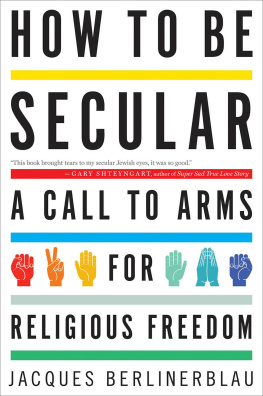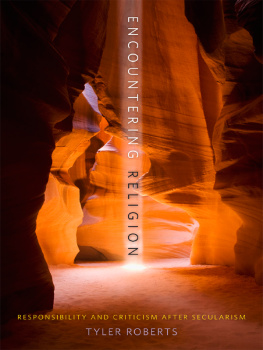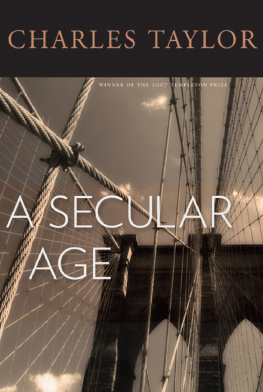Lessons in Secular Criticism
ADVISORY BOARD
Andrew Benjamin
Richard J. Bernstein
Peg Birmingham
Adriana Cavarero
Moira Gatens
Peggy Kamuf
Jeff Malpas
Martin McQuillan
Henry Sussman
Peter Szendy
Samuel Weber

Thinking Out Loud: The Sydney Lectures in Philosophy and Society
These annual lectures aim to be theoretical in nature, but also to engage a general audience on questions about politics and society. The lectures are organized by the University of Western Sydney, in collaboration with ABC Radio National, the State Library of New South Wales, and Fordham University Press.
BOOK SERIES EDITOR
Dimitris Vardoulakis
LECTURE SERIES EXECUTIVE COMMITTEE
Chair : Dimitris Vardoulakis
Christopher Peterson
Joe Gelonesi
Helen Tartar


Copyright 2013 Fordham University Press
All rights reserved. No part of this publication may be reproduced, stored in a retrieval system, or transmitted in any form or by any meanselectronic, mechanical, photocopy, recording, or any otherexcept for brief quotations in printed reviews, without the prior permission of the publisher.
Fordham University Press has no responsibility for the persistence or accuracy of URLs for external or third-party Internet websites referred to in this publication and does not guarantee that any content on such websites is, or will remain, accurate or appropriate.
Fordham University Press also publishes its books in a variety of electronic formats. Some content that appears in print may not be available in electronic books.
Library of Congress Cataloging-in-Publication Data
Gourgouris, Stathis, 1958
Lessons in secular criticism / Stathis Gourgouris. First edition
pages cm. (Thinking Out Loud)
Includes index.
Summary: Secular criticism is a term invented by Edward Said to denote, not a theory, but a practice that counters the tendency of much of modern thinking to reach for a transcendentalist comfort zone, the very space philosophy wrested away from religion in the name of modernity. Using this notion as a compass, this book reconfigures the recent secularism debates on an entirely different basis, by showing: 1) how the secular imagination is closely linked to societys radical poiesis, its capacity to imagine and create unprecedented forms of worldly existence; and 2) how the space of the secular animates the desire for a radical democratic politics that overturns inherited modes of subjugation, whether religious or secularist. Indeed, the point is to disrupt the co-dependent relation between the religious and the secularhence, the rejection of fashionable languages of post-secularismin order to engage in a double critique against heteronomous politics of all kinds. For Gourgouris, secular criticism is a form of political being, critical, anti-foundational, disobedient, anarchic, yet not negative for negations sake, but creative of new forms of collective reflection, interrogation, and action, which alter not only the current terrain of dominant politics but the very self-conceptualization of what it means to be human. Written in free and combative style, as was the demand of the Sydney Library Lectures to think out loud, and given both to close readings of texts and examinations of the broad horizon, these essays cover a range of issues, historical and philosophical, archaic and contemporary, literary and political that ultimately converge on the significance of contemporary radical politicsthe assembly movements we have seen in various parts of the world in the last couple of years. The secular imagination demands a radical pedagogy and a great deal of unlearning established thought patterns. Its most important dimension is not battling religion per se, but dismantling theological politics of sovereignty in favor of creating radical conditions for social autonomy Provided by publisher.
ISBN 978-0-8232-5378-4 (hardback) ISBN 978-0-8232-5379-1 (paper)
1. LiteraturePhilosophy 2. Secularism in literature. 3. Criticism. 4. Religion and literature. I. Title.
PN49.G6366 2013
809'.93382dc23
2013002237
Printed in the United States of America
15 14 13 5 4 3 2 1
First edition
to my nephews, Orestis and Iason,
to my son, Petros,
and to the youth of the world,
whom my generation
has failed
Contents
In 1977, three years before his fatal accident, Roland Barthes was elected to the Chair of Literary Semiology at the Collge de France and gave the celebrated inaugural lecture that was published under the simple title Leon (1978). It was a lesson in perfect Barthes fashion, on the power of a certain kind of language to resist the totalizing power that exists in the midst of all language as a social institution. He specified this as the language of literature, but he configured it broadly enough for literature to coincide with the act of writing as such or the creation of a certain textuality, as was the idiom of the day. But, remarkably, there is nothing dated in this train of thought, even if the permutations of power in todays world have significantly changed, in part by having absorbed the knowledge and language of counterpower developed by that preeminent generation of thinkers.
Barthes delivers here an inaugural lesson and, at the same time, a discourse on lesson, on the act of seeking new ideas by thinking out loud in front of a seminar audience, as have been the time-honored practices of the seminars at the Sorbonne. His phrasing for this activityto These questions go to the heart of the contemporary discussion about higher education in the Euro-American sphere, in a historical moment shamelessly driven by the command to turn universities into corporations, while simultaneously proclaiming the social irrelevance of a humanities mode of learning in a market of quantifiable skills.
This paradoxical privilege of inhabiting the institutions of power but speaking a language hors pouvoir from within has been the main target of the methodical corporatization of the university in Europe and North America. In the political juncture of his day, Barthes remains unaware of this as a possibility in the future, but in retrospect he seems to be conducting a ceremony about the nature of the life of the university on the horizon of its eventual extinction. This too is part of the paradoxical privilege. It haunts our every utterance, perhaps less in the classroom, where the experimental nature of all pedagogy is palpable and real bodies with real minds and real affect shake language from its sovereignty, but surely when we seek to speak against the institution, or outside it, in a public sphere desperately trying to protect itself from its own increasing abstraction. Barthes explicitly calls language fascist, not because it represses what we say but because it compels what we say. So the wager of speaking hors pouvoir of daring to think of speaking hors pouvoir is how we outmaneuver this compulsion, how we speak against the language that speaks us, to use again the idiom of the day, and therefore, to cheat with speech, to cheat speech [ tricher avec la langue, tricher la langue ] (462).
To be accurate, this wager is less about language, simply in a linguistic sense, and more about exposing how in what language, in what manner, with what stagingsocietys institutions speak on their behalf and against what threatens them, or even more precisely, on how institutions sustain their believability by rendering their adversaries unbelievable, incredible, and indeed impossible. After all, this was the mark of Barthess maverick semiology, which, let us not forget, foregrounded societys mythographic theatricality long before discourses of performativity became current. S/Z was about impersonation, and its strategy of reading ultimately drew more from Brecht than from Saussure. So here, too, the handling of language is dramatic: Because it stages [ met en scne ] language instead of simply using it, literature feeds knowledge into the machinery of infinite reflexivity: through writing, knowledge ceaselessly reflects on knowledge, in terms of a discourse that is no longer epistemological, but dramatic (46364).
Next page

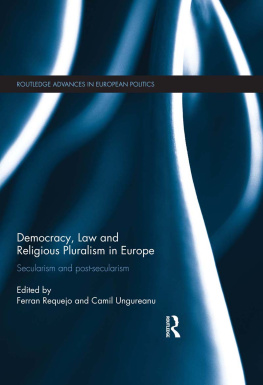
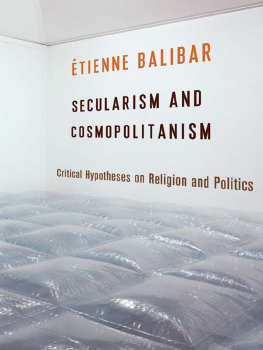
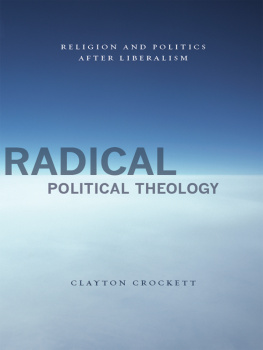
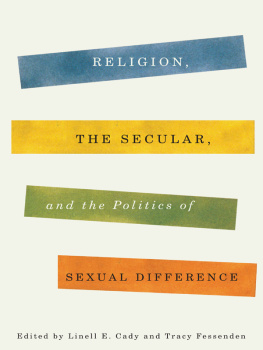
![Blackford - Freedom of religion [and] the secular state](/uploads/posts/book/167779/thumbs/blackford-freedom-of-religion-and-the-secular.jpg)
